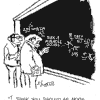20.11.2007 | 18:12
Rķkissjóšur er vita fallķt og žaš veit S&P vel
Greiningardeildir bankanna eru aš vissu leyti gagnlegar - ef žś leitar aš žvķ sem žęr ręša ekki. Nśna nema skammtķmaskuldir žjóšarbśsins eitthvaš um 1500 milljöršum króna. Žetta setur krónuna ķ mikla hęttu og raunverulega žar sem sešlabankinn er mįttvana dvergur sem ašeins hefur gjaldeyrisvarasjóš upp į um einn tķunda hluta skammtķmaskulda žjóšarbśsins. Og žaš eftir aš skattgreišendur tóku 90 milljarša króna lįn fyrir įri til aš koma sešlabankanum śr mķkrófyrirbęri upp ķ aš vera dvergur. Žetta er hinn harši veruleiki. Ef vel ętti aš vera og viš vęrum meš sešlabanka sem minnsta mark vęri į takandi žyrfti hann helst aš vera meš gjaldeyrisvarasjóš upp į ķ žaš allra minnsta helming skammtķmaskulda žjóšarbśsins. Žaš er of lķtiš en hugsanlega nóg ķ neyš.
Sem sagt; rķkissjóšur Ķslands (skattgreišendur) žarf naušsynlega aš taka hundruši milljarša aš lįni til aš proppa upp žennan gjaldžrota sešlabanka okkar en getur žaš aš sjįlfsögšu ekki žar sem tekjur hans standa ekki undir slķku. Ergo; hann er tęknilega fallķt.

|
Undirstaša ķslenska hagkerfisins enn traust |
| Tilkynna um óvišeigandi tengingu viš frétt | |
Bloggar | Slóš | Facebook | Athugasemdir (4)
19.11.2007 | 18:38
NY Stock Exchange Contracting Margin Debt Levels Sending Bearish Message
Bloggar | Slóš | Facebook | Athugasemdir (1)
19.11.2007 | 15:04
Holl og naušsynleg leišrétting
Markašurinn var oršinn ótrślega yfirkeyptur ķ sumar og žvķ var leišrétting bara spurning um tķma.
Sumariš 2006 stóš langur slagur um tęknilega biliš sirka 5200-6000 og finnst mér ekki ólķklegt aš markašurinn muni athuga žaš nįnar. En ekkert fer žó alveg beint upp eša nišur į markaši.

|
Śrvalsvķsitalan lękkar um 2,67% |
| Tilkynna um óvišeigandi tengingu viš frétt | |
Bloggar | Slóš | Facebook | Athugasemdir (1)
19.11.2007 | 13:16
Skiptir ķ sjįlfu sér engu mįli hvar trakkerinn er stašsettur

|
Eigandi Torrent yfirheyršur |
| Tilkynna um óvišeigandi tengingu viš frétt | |
Bloggar | Slóš | Facebook | Athugasemdir (7)
19.11.2007 | 11:23
Church of the Flying Spaghetti Monster
Pasta Monster Gets Academic Attention

http://ap.google.com/article/ALeqM5izIdAiH7TCkYQq8AvK6KbH480paAD8SUOUQG1
When some of the world's leading religious scholars gather in San Diego this weekend, pasta will be on the intellectual menu. They'll be talking about a satirical pseudo-deity called the Flying Spaghetti Monster, whose growing pop culture fame gets laughs but also raises serious questions about the essence of religion.
The appearance of the Flying Spaghetti Monster on the agenda of the American Academy of Religion's annual meeting gives a kind of scholarly imprimatur to a phenomenon that first emerged in 2005, during the debate in Kansas over whether intelligent design should be taught in public school sciences classes.
Supporters of intelligent design hold that the order and complexity of the universe is so great that science alone cannot explain it. The concept's critics see it as faith masquerading as science.
An Oregon State physics graduate named Bobby Henderson stepped into the debate by sending a letter to the Kansas School Board. With tongue in cheek, he purported to speak for 10 million followers of a being called the Flying Spaghetti Monster — and demanded equal time for their views.
"We have evidence that a Flying Spaghetti Monster created the universe. None of us, of course, were around to see it, but we have written accounts of it," Henderson wrote. As for scientific evidence to the contrary, "what our scientist does not realize is that every time he makes a measurement, the Flying Spaghetti Monster is there changing the results with His Noodly Appendage."
The letter made the rounds on the Internet, prompting laughter from some and vilification from others. But it struck a chord and stuck around. In the great tradition of satire, its humor was in fact a clever and effective argument.
Between the lines, the point of the letter was this: There's no more scientific basis for intelligent design than there is for the idea an omniscient creature made of pasta created the universe. If intelligent design supporters could demand equal time in a science class, why not anyone else? The only reasonable solution is to put nothing into sciences classes but the best available science.
"I think we can all look forward to the time when these three theories are given equal time in our science classrooms across the country, and eventually the world; one third time for Intelligent Design, one third time for Flying Spaghetti Monsterism, and one third time for logical conjecture based on overwhelming observable evidence," Henderson sarcastically concluded.
Kansas eventually repealed guidelines questioning the theory of evolution.
Meanwhile, Flying Spaghetti Monsterism (FSM-ism to its "adherents") has thrived — particularly on college campuses and in Europe. Henderson's Web site has become a kind of cyber-watercooler for opponents of intelligent design.
Henderson did not respond to a request for comment. His Web site tracks meetings of FSM clubs (members dress up as pirates) and sells trinkets and bumper stickers. "Pastafarians" — as followers call themselves — can also download computer screen-savers and wallpaper (one says: "WWFSMD?") and can sample photographs that show "visions" of the divinity himself. In one, the image of the carbohydrate creator is seen in a gnarl of dug-up tree roots.
It was the emergence of this community that attracted the attention of three young scholars at the University of Florida who study religion in popular culture. They got to talking, and eventually managed to get a panel on FSM-ism on the agenda at one of the field's most prestigious gatherings.
The title: "Evolutionary Controversy and a Side of Pasta: The Flying Spaghetti Monster and the Subversive Function of Religious Parody."
"For a lot of people they're just sort of fun responses to religion, or fun responses to organized religion. But I think it raises real questions about how people approach religion in their lives," said Samuel Snyder, one of the three Florida graduate students who will give talks at the meeting next Monday along with Alyssa Beall of Syracuse University.
The presenters' titles seem almost a parody themselves of academic jargon. Snyder will speak about "Holy Pasta and Authentic Sauce: The Flying Spaghetti Monster's Messy Implications for Theorizing Religion," while Gavin Van Horn's presentation is titled "Noodling around with Religion: Carnival Play, Monstrous Humor, and the Noodly Master."
Using a framework developed by literary critic Mikhail Bakhtin, Van Horn promises in his abstract to explore how, "in a carnivalesque fashion, the Flying Spaghetti Monster elevates the low (the bodily, the material, the inorganic) to bring down the high (the sacred, the religiously dogmatic, the culturally authoritative)."
The authors recognize the topic is a little light by the standards of the American Academy of Religion.
"You have to keep a sense of humor when you're studying religion, especially in graduate school," Van Horn said in a recent telephone interview. "Otherwise you'll sink into depression pretty quickly."
But they also insist it's more than a joke.
Indeed, the tale of the Flying Spaghetti Monster and its followers cuts to the heart of the one of the thorniest questions in religious studies: What defines a religion? Does it require a genuine theological belief? Or simply a set of rituals and a community joining together as a way of signaling their cultural alliances to others?
In short, is an anti-religion like Flying Spaghetti Monsterism actually a religion?
Joining them on the panel will be David Chidester, a prominent and controversial academic at the University of Cape Town in South Africa who is interested in precisely such questions. He has urged scholars looking for insights into the place of religion in culture and psychology to explore a wider range of human activities. Examples include cheering for sports teams, joining Tupperware groups and the growing phenomenon of Internet-based religions. His 2005 book "Authentic Fakes: Religion and American Popular Culture," prompted wide debate about how far into popular culture religious studies scholars should venture.
Lucas Johnston, the third Florida student, argues the Flying Spaghetti Monsterism exhibits at least some of the traits of a traditional religion — including, perhaps, that deep human need to feel like there's something bigger than oneself out there.
He recognized the point when his neighbor, a militant atheist who sports a pro-Darwin bumper sticker on her car, tried recently to start her car on a dying battery.
As she turned the key, she murmured under her breath: "Come on Spaghetti Monster!"
- Church of the Flying Spaghetti Monster: http://www.venganza.org/
- American Academy of Religion: http://www.aarweb.org/
Bloggar | Slóš | Facebook | Athugasemdir (0)
17.11.2007 | 21:48
Stóra kaffibaunamįliš
Bloggar | Slóš | Facebook | Athugasemdir (0)
17.11.2007 | 17:10
Saudi minister warns of dollar collapse
Saturday, 17th November 2007
http://www.thebusiness.co.uk/news-and-analysis/358346/saudi-minister-warns-of-dollar-collapse.thtml
The dollar could collapse if Opec officially admits considering changing the pricing of oil into alternative currencies such as the euro, the Saudi Arabian foreign minister has warned.
Prince Saud Al-Faisal was overheard ruling out a proposal from Iran and Venezuela to discuss pricing crude in a private meeting at the oil cartel's conference.
In an embarrassing blunder at the meeting in Riyadh, ministers' microphones were not cut off during a key closed meeting, and Prince Al-Faisal was heard saying: "My feeling is that the mere mention that the Opec countries are studying the issue of the dollar is itself going to have an impact that endangers the interests of the countries. "There will be journalists who will seize on this point and we don't want the dollar to collapse instead of doing something good for Opec."
After around 40 minutes press officials cut off the feed, which had been accidentally broadcast to the press room.
Prince Al-Faisal added: "This is not new. We have done this in the past: decide to study something without putting down on paper that we are going to study it so that we avoid any implication that will bring adverse effects on our countries' finances."
Iran and Venezuela have argued that the meeting's final communique should voice concern about the level of the dollar, which has recently fallen to new record lows against the euro. They are pushing for oil to be denominated against a basket of currencies.
The greenback also weakened slightly against the pound, although sterling's own recent weakness has pushed it down from $2.10 to $2.0457 during the week.
Nigerian finance minister Shamsuddeen Usman said that Opec could declare in the communique that: "While underlining our concern for the continued depreciation of the dollar and its adverse impact on our revenues, we instruct our finance ministers to study the issue exhaustively and advise us on ways to safeguard the purchasing power of our revenues, of our members' revenues."
Chancellor Alistair Darling will today urge his fellow finance ministers at a major G20 summit to increase investment in oil production and refinement.
Bloggar | Slóš | Facebook | Athugasemdir (0)
13.11.2007 | 20:22
Guš kemur śt śr skįpnum, eša öllu heldur hönnušir hans
Milli žess sem mišaldamunkar rišlušust hver į öšrum sušu žeir saman žessa biblķusteypu sem menn hafa veriš į flótta meš sķšan eftir žvķ sem almenn upplżsing hefur aukist.
Lesiš nįnar um žetta hér:
Jehovah Finally Comes Out of the Closet!
http://www.darrellwconder.com/outofcloset.html
Bloggar | Slóš | Facebook | Athugasemdir (5)
13.11.2007 | 10:48
Argentķna: Vilja nota bandar. ašferšir til aš "skilgreina" veršbólguna nišur
http://www.nypost.com/seven/11062007/business/the_times_finally_gets_it___on_jobs_figu_44557.htm
November 6, 2007 -- WHO says the U.S. doesn't export anything nowadays?
The government of Argentina, beset by criticism over rampant inflation, said it is considering using the American way of calculating rising prices.
The idea, of course, is to make inflation disappear statistically even while it's quite obvious in real life.
This is a real knee-slapper for those of us who follow this stuff for a living.
But it also gives me a quite serious segue into what I'd like to talk about today: why the U.S. financial markets are in such a delicate state these days.
Start with the subject of inflation.
As I mentioned in a column last Thursday, the way Washington calculates inflation allowed the Commerce Department to report that prices rose only 0.8 percent in the third quarter.
That is a quite tame inflation reading, even though commodities and other prices are telling a much different story.
The mild inflation number, in turn, permitted Washington to claim that the economy grew at a healthy annual rate of 3.9 percent in the quarter.
For each tick up in inflation the economy measured by the gross domestic product would have grown by that much less.
All that good economic news - dishonest as it is - was confirmed on Friday when the Labor Department reported that 166,000 new jobs were created in October.
That figure was about double the number Wall Street experts were expecting and far exceeded the 96,000 increase in the prior month.
But the jobs number isn't what it seems either.
As I mentioned last Thursday and have been bringing up for oh-so-many years, the October employment figure was juiced by an estimate for jobs the government believes - but can't prove - are being created by newly-formed companies that are not surveyed.
This time the guesstimate - officially called the birth/death model - accounted for around 103,000 of the 166,000 new October jobs.
(I'd like to take a little break here to bring out the trumpets - Toootoooto).
On Saturday, The New York Times - after missing the point for decades - finally ran a story headlined "Despite Gain In Job Data, Wall Street Is Skeptical.)
Bloggar | Slóš | Facebook | Athugasemdir (0)
Um bloggiš
Baldur Fjölnisson
Nżjustu fęrslur
- Torfi Stefįns bannašur ęvilangt
- OL ķ skįk. Landinn malaši Kenķu ķ 9. umferš
- OL ķ skįk: Landinn ķ 88. sęti eftir 8 umferšir
- Mešaljónar ķ skįkinni
- Baggalśtur - Sagan af Jesśsi
- Eitraš fyrir lżšnum?
- Óvenjulega döpur taflmennska innfęddra einkennir Reyjavķkursk...
- U.S. Rushes Coolant to Japanese Nuke Plant After Earthquake
Heimsóknir
Flettingar
- Ķ dag (29.7.): 0
- Sl. sólarhring: 1
- Sl. viku: 3
- Frį upphafi: 0
Annaš
- Innlit ķ dag: 0
- Innlit sl. viku: 2
- Gestir ķ dag: 0
- IP-tölur ķ dag: 0
Uppfęrt į 3 mķn. fresti.
Skżringar
Bloggvinir
-
 Agný
Agný
-
 Alfreð Símonarson
Alfreð Símonarson
-
 Andrea J. Ólafsdóttir
Andrea J. Ólafsdóttir
-
 Bjarni Harðarson
Bjarni Harðarson
-
 Bjarni Kjartansson
Bjarni Kjartansson
-
 Björgvin Gunnarsson
Björgvin Gunnarsson
-
 Brynjar Jóhannsson
Brynjar Jóhannsson
-
 FLÓTTAMAÐURINN
FLÓTTAMAÐURINN
-
 Eygló Þóra Harðardóttir
Eygló Þóra Harðardóttir
-
 FreedomFries
FreedomFries
-
 Fríða Eyland
Fríða Eyland
-
 Félag um stafrænt frelsi á Íslandi
Félag um stafrænt frelsi á Íslandi
-
 Georg P Sveinbjörnsson
Georg P Sveinbjörnsson
-
 Gestur Guðjónsson
Gestur Guðjónsson
-
 Gils N. Eggerz
Gils N. Eggerz
-
 Gullvagninn
Gullvagninn
-
 Gunnar Skúli Ármannsson
Gunnar Skúli Ármannsson
-
 Guðrún María Óskarsdóttir.
Guðrún María Óskarsdóttir.
-
 Gísli Hjálmar
Gísli Hjálmar
-
 Hagbarður
Hagbarður
-
 Halla Rut
Halla Rut
-
 Haraldur Haraldsson
Haraldur Haraldsson
-
 Hilmar Kári Hallbjörnsson
Hilmar Kári Hallbjörnsson
-
 Hlekkur
Hlekkur
-
 Ingibjörg Álfrós Björnsdóttir
Ingibjörg Álfrós Björnsdóttir
-
 Jens Guð
Jens Guð
-
 Jóhannes Ragnarsson
Jóhannes Ragnarsson
-
 Jón Aðalsteinn Jónsson
Jón Aðalsteinn Jónsson
-
 Jón Ragnarsson
Jón Ragnarsson
-
 Jón Steinar Ragnarsson
Jón Steinar Ragnarsson
-
 Jónína Benediktsdóttir
Jónína Benediktsdóttir
-
 Karl Tómasson
Karl Tómasson
-
 Kári Magnússon
Kári Magnússon
-
 Loopman
Loopman
-
 Magnús Þór Hafsteinsson
Magnús Þór Hafsteinsson
-
 Promotor Fidei
Promotor Fidei
-
 Rúnar Sveinbjörnsson
Rúnar Sveinbjörnsson
-
 Salvör Kristjana Gissurardóttir
Salvör Kristjana Gissurardóttir
-
 Sandra María Sigurðardóttir
Sandra María Sigurðardóttir
-
 SeeingRed
SeeingRed
-
 Sigurbjörn Friðriksson
Sigurbjörn Friðriksson
-
 Sigurjón Þórðarson
Sigurjón Þórðarson
-
 Sigurður Þórðarson
Sigurður Þórðarson
-
 Snorri Hrafn Guðmundsson
Snorri Hrafn Guðmundsson
-
 el-Toro
el-Toro
-
 Sveinn Ingi Lýðsson
Sveinn Ingi Lýðsson
-
 Tryggvi Hjaltason
Tryggvi Hjaltason
-
 TómasHa
TómasHa
-
 Túrilla
Túrilla
-
 Upprétti Apinn
Upprétti Apinn
-
 gudni.is
gudni.is
-
 haraldurhar
haraldurhar
-
 proletariat
proletariat
-
 Ívar Pálsson
Ívar Pálsson
-
 Ómar Ragnarsson
Ómar Ragnarsson
-
 Ónefnd
Ónefnd
-
 Óskar
Óskar
-
 Óskar Helgi Helgason
Óskar Helgi Helgason
-
 Óskar Þ. G. Eiríksson
Óskar Þ. G. Eiríksson
-
 Þórir Kjartansson
Þórir Kjartansson
-
 Arnar Guðmundsson
Arnar Guðmundsson
-
 Bara Steini
Bara Steini
-
 Birgir R.
Birgir R.
-
 Birgir Rúnar Sæmundsson
Birgir Rúnar Sæmundsson
-
 brahim
brahim
-
 Brosveitan - Pétur Reynisson
Brosveitan - Pétur Reynisson
-
 Bwahahaha...
Bwahahaha...
-
 Dingli
Dingli
-
 eysi
eysi
-
 Gestur Kristmundsson
Gestur Kristmundsson
-
 Guðbjörg Elín Heiðarsdóttir
Guðbjörg Elín Heiðarsdóttir
-
 Gunnar Helgi Eysteinsson
Gunnar Helgi Eysteinsson
-
 Gunnar Rögnvaldsson
Gunnar Rögnvaldsson
-
 Helgi Jóhann Hauksson
Helgi Jóhann Hauksson
-
 Hlini Melsteð Jóngeirsson
Hlini Melsteð Jóngeirsson
-
 Jakobína Ingunn Ólafsdóttir
Jakobína Ingunn Ólafsdóttir
-
 Katrín Snæhólm Baldursdóttir
Katrín Snæhólm Baldursdóttir
-
 kreppukallinn
kreppukallinn
-
 Kristín Magdalena Ágústsdóttir
Kristín Magdalena Ágústsdóttir
-
 Máni Ragnar Svansson
Máni Ragnar Svansson
-
 Morgunblaðið
Morgunblaðið
-
 Neo
Neo
-
 Orgar
Orgar
-
 Ragnar L Benediktsson
Ragnar L Benediktsson
-
 Rauði Oktober
Rauði Oktober
-
 Skákfélagið Goðinn
Skákfélagið Goðinn
-
 Sveinn Þór Hrafnsson
Sveinn Þór Hrafnsson
-
 Vilhjálmur Árnason
Vilhjálmur Árnason
-
 Þór Ludwig Stiefel TORA
Þór Ludwig Stiefel TORA





